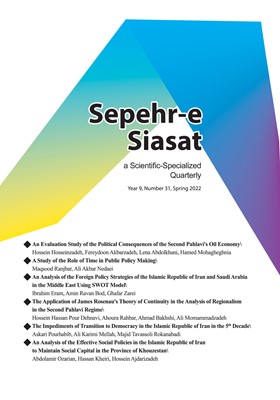The Impediments of Transition to Democracy in the Islamic Republic of Iran in the 5th Decade
Subject Areas : Iranian Political ResearchAskari Pourhabib 1 , Ali Karimi Mellah 2 * , Majid Tavassoli Rokanabadi 3
1 - PhD., Student in Political Sociology, Department of Political Science, Faculty of Law,
Theology and Political Science, Science and Research Branch, Islamic Azad University,
Tehran, Iran
2 - Professor, Department of Political Science, Faculty of Law and Political Science, Mazandaran University, Mazandaran, Iran
3 - Associate Professor, Department of Political Science, Faculty of Law, Theology and Political Science, Science and Research Branch, Islamic Azad University, Tehran, Iran.
Keywords: Process Analysis, Futurology, Islamic Revolution of Iran, democracy, Obstacles,
Abstract :
The purpose of the present study is to review the most important impediments to transition to democracy in the Islamic Republic of Iran in the 5th decade with a futuristic approach. Among different methods of futurology, analysis of the selected process with a qualitative approach was used in this research. The research population was composed of a selection of academic experts in the subject of political transition and the sample size was determined by theoretical consecutive sampling. Data collection instrument was a semi-structured interview that reached theoretical saturation by doing 16 interviews. The results showed that some factors such as structural and normative integrity between the dominant elites, weak civil society, lack of economic prerequisites, and a rentier state are among the most important impediments to peaceful transition to democracy and strengthening that in the 5th decade of the revolution. These obstacles in front of democracy in the 5th decade of the revolution have a social and structural nature that decelerate the process of peaceful advancement to democracy and strengthening that by an accumulative effect on each other as well as on the political structure and cause that transition to democracy in the 5th decade of the revolution does not proceed with an expected speed.
استوار، مجید (1396). گذار به دموکراسی در ایران با تأکید بر نقش نخبگان. دولتپژوهی، 3(11).
افتخاری، علیاصغر (1380). درآمدی بر خطوط قرمز رقابتهای سیاسی. تهران: مرکز بررسیهای استراتژیک ریاست جمهوری و نشر فرهنگ گفتمان.
بشیریه، حسین (1384). گذار به دموکراسی. تهران: نگاه معاصر، چاپ دوم.
بشیریه، حسین (1394). گذار به دموکراسی، نگاه معاصر. تهران: نگاه معاصر، چاپ پنجم.
بشیریه، حسین (1385). دیباچهاى بر جامعهشناسى سیاسى ایران در دوره جمهورى اسلامى ایران. تهران: نشر نگاه معاصر.
پدرام، عبدالرحیم؛ جلالیوند، عباس (١٣٩٠). آشنایی با آیندهپژوهی (مجموعه کتابچههای آموزشی آیندهپژوهی). تهران: مرکز آیندهپژوهی علوم و فناوری و دفاعی، ج7.
حاجیانی، ابراهیم (١٣٩١). مبانی، اصول و روشهای آیندهپژوهی. تهران: انتشارات دانشگاه امام صادق(ع).
حافظنیا، محمدرضا (1377(. مقدمهای بر روش تحقیق در علوم انسانی. تهران: سمت.
دلاور، علی (1383(. مبانی نظری و عملی پژوهش. تهران: رشد.
صادیکی، لاری (1380). دموکراسی و جامعه مدنی در خاورمیانه. ترجمه محمدتقی دلفروز. تهران: روزنامه سلام.
فریدمن، میلتون؛ فریدمن، رز (1367). آزادی انتخاب. ترجمه حسین حکیمزاده جهرمی. تهران: انتشارات پارسی.
قاسمی، علیاصغر (1390). جهانیشدن جنبشهای اجتماعی و دموکراسی در ایران. پژوهش سیاست نظری، شماره 10.
قاضی مرادی، حسن (1397). گذارهای دموکراسی. تهران: نشر اختران.
لیپست، سیمون مارتین (1381). دائرةالمعارف دموکراسی. ترجمه کامران آقاخانی و نورالله مرادی. تهران: انتشارات وزارت امورخارجه.
موسوینیا، سید رضا (1396). روش پژوهش آسان در علوم انسانی. تهران: نشر مخاطب.
هانتینگتون، ساموئل (1382). موج سوم دموکراسی در پایان سده بیستم. ترجمه احمد شهسا. تهران: نشر روزنه، چاپ سوم.
یوسفی، اشکان؛ کشاورز ترک، عینالله؛ نهادی، هادی (1398). بررسی تأثیر مولفههای فرهنگی و اجتماعی دفاع مقدس بر آیندۀ امنیت ملی جمهوری اسلامی ایران. راهبرد دفاعی، شماره 17، ص69-96.
Anderson, J. & Aslaksen, S. (2013). Oil and political Surval. Journal of Develomat, No.100.
Fild, L., Higley, J. & Burton, G. (1990). A New Elite Framework for Political Sociology. Revue Europeene des science Sociales, Vol.28, P.149-182.
Inglehart, R. & Welzel, Ch. (2005). Modernization cultural change and and Democracy: The Human Development Sequence. Cambridge United Kingdom: University Press.
Kamrava, M. & More, F. (1998). Civill Society & Democratizing in comparative: Lation America & the Middle East. Third World Quarterly, Vol.19, No.5.
Strauss, A.L. & Corbin, J.M. (1994). Basics of qualitative research, techniques and procedures for developing grounded theory. (2nd ed.). Thousand Oaks: Sage Press.
_||_

